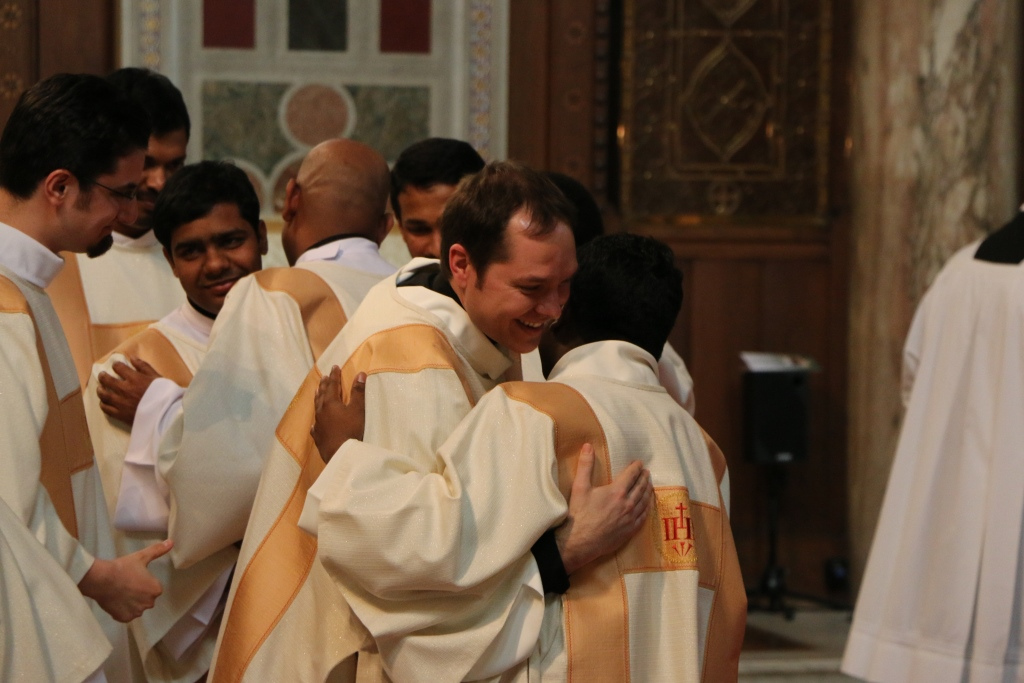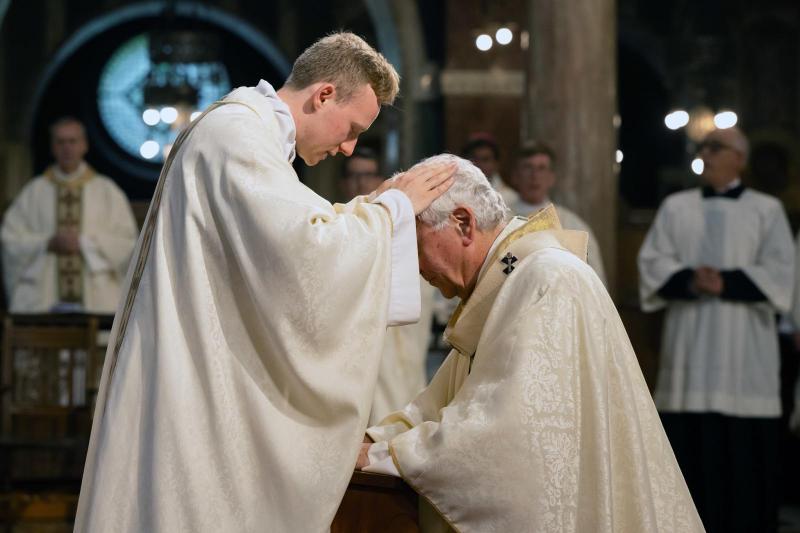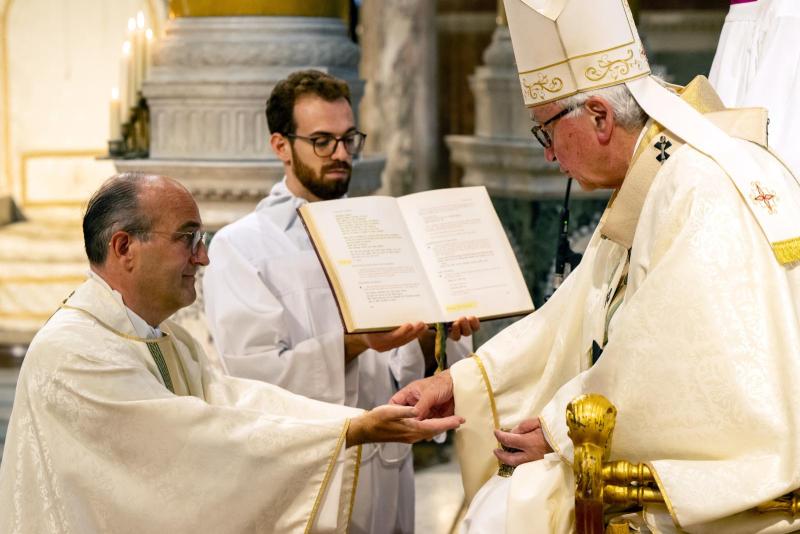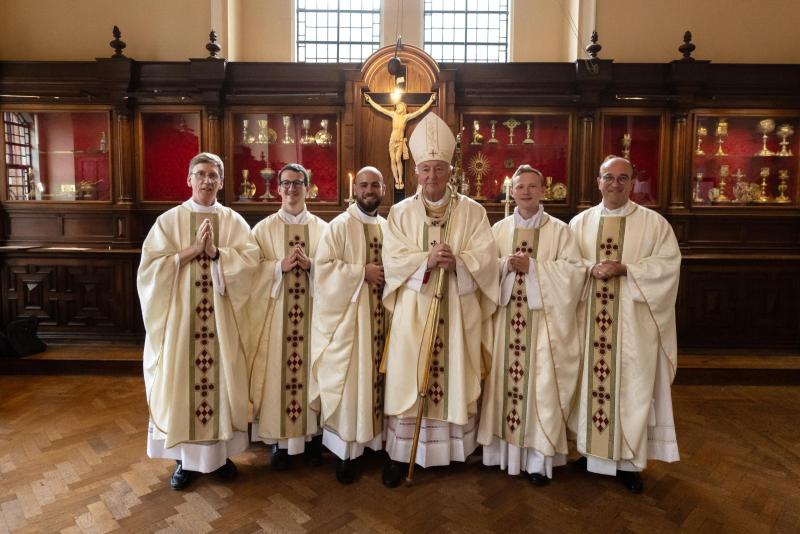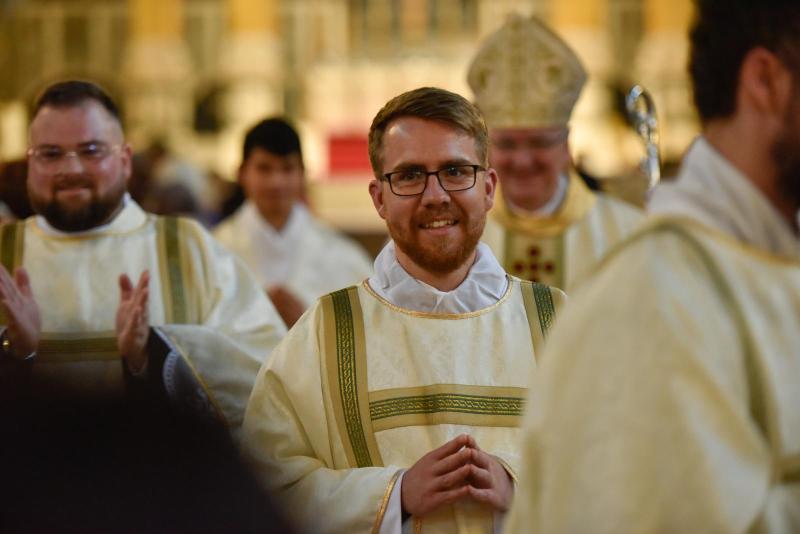2014 is a year of particular celebration for the English Jesuits as it marks both the 400th anniversary of the founding of Heythrop College by English Jesuits and the 200th anniversary of the Restoration of the Society of Jesus. A highlight of the year was the recent ordination to the diaconate by Cardinal Vincent at Westminster Cathedral of nine Jesuits – from India, Sri Lanka, Germany, Brazil and Kenya – who are all currently studying at Heythrop.
Below, two of the nine men, Bollineni Bala Kumar SJ and Matthias Kramm SJ, reflect on their calling. The interview, conducted by Fr Richard Nesbitt, took place just a few days before the ordination...
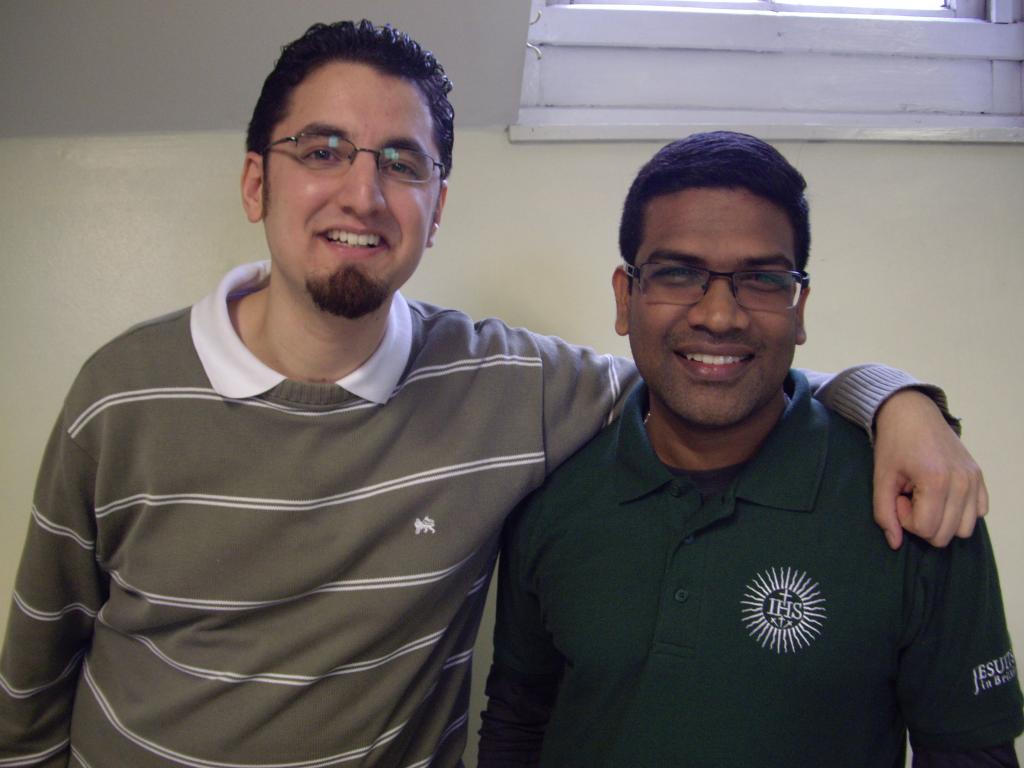
How are you feeling just before your ordination?
Matthias: In a sense, even after 10 years of formation, I don’t feel fully ready but I think it is simply a moment for a deeper trust in God. It is a moment to place myself more fully into his care. This is not about me, it’s about God working through me.
Bala: Yes, this feels like a very grace-filled moment when I need to surrender completely to his care. I am eager to be at his service – this has been the greatest desire of my life since childhood onwards – to be his priest. He has always been faithful to me, and I know he always will be.
You say that this has been with you from your childhood years. You both still look very young – I don’t think either of you has a grey hair yet! So I imagine that you must have been very young when you entered formation. How did it all begin?
Bala: In my case, I grew up in a very rural area in India and the teachers always used to ask us, “What would you like to be when you grow up?” Most of my classmates said “A doctor”, “An engineer”... but my answer was always “A priest”. My life at my local church – Mass, morning and evening prayers, the rosary, serving at Mass, helping the priests around the presbytery – was very important for me. It drew me to the priesthood. When I finished secondary school, I went to see my parish priest and told him that I wanted to become a priest. Knowing my personality, he advised me to join a religious order and in particular the Jesuits, even though he warned me that they take a much longer time for their formation. He explained that they are a strongly international congregation with very solid formation, as well as being very open-minded, reaching out to different people all over the world. This all sounded very attractive. I trusted my parish priest as he knew me so well. My parents were initially rather reluctant, especially as they had only two boys at home and we lived in a society in which sons are much treasured. But when they saw that I was serious about this, they allowed me to make my own decision. So I applied to the Jesuits and I have never regretted this for a moment.
Matthias: My case is quite different because at the age of 15/16 I began to feel increasingly alienated from the Church. I couldn’t really see the purpose of it all, and why I should believe in Christ. I started to read atheist philosophers like Jean-Paul Sartre and Albert Camus. Looking back, it was not a very mature engagement with this world, but it was what seemed to fascinate me. Only 3 years later, when I was doing my Confirmation preparation at the age of 18, did I rediscover my Christian faith and realised that all the questions I was asking found their answer in the person of Jesus Christ, who was calling me in a very personal way to follow him. This was a real turning point for me. The sense of vocation grew within me, but I still had a very rational approach to it all. I spoke first to my father, who recommended that I should consider religious orders because of their community life. I didn’t know much about religious life so I decided to talk to a Franciscan, a Dominican and a Jesuit. It sounds a bit like the start of a joke! Of the three I was most strongly drawn to the Jesuits who had a definite vocation promotion and so I got to know more about Ignatian spirituality and it was this spirituality which drew me closer and finally convinced me that I should enter the Society of Jesus.
Very different paths in many ways... So here we are, 10 years and 19 years later! For a lot of people who are thinking about a possible vocation to the Jesuits, this very long time of formation is usually a massive consideration. Could you help to explain why it takes so long!
Bala: This is the wisdom of the Society. It has never stipulated that formation will last x years. It is adaptable and flexible, recognising, for example, that we have a different context in Europe, in Asia and in Africa. In the Indian context, most of our vocations are young men coming straight from school. This means that the Society has to train such men in their formal studies as well and most of us come from our own vernacular backgrounds so there are also language issues to be addressed. In the first year we usually explore what the Society of Jesus is, and we are also taught English. So I started learning English when I was 16 and was then sent to a Jesuit College to study A-levels, with a formation advisor. After these 3 initial years of scrutiny you are promoted to the novitiate. That is the official moment of entry into the Society of Jesus. Then we do a one year Juniorate, which is an introduction to humanities which is followed by 3 years of Bachelor’s Degree. Then we study 2 years of Philosophy, followed by 2years of Regency (a pastoral placement, in one of the Jesuit ministries around the world). The final stage of formation before Priesthood is 4 years of Theology. After the completion of Regency some of us are asked to do a Master’s Degree. In my case, I spent two years studying an MSc in Psychological Counselling in Bangalore then was asked to go to Ireland to do an extra year of Regency. This list may look frighteningly long but, believe me, the years just fly by!
Matthias: In Europe it’s shorter as we do not have the pre-novitiate. So it’s 2 years of novitiate, preparing to take the vows of poverty, chastity and obedience, which is also a time of getting to know the Society of Jesus and myself better, but first and foremost to deepen my relationship with God. It’s a very important time, during which we also do the 30-day retreat, have different experiences of working amongst the poor. After that I went for philosophy, which took me 4½ years as I also did a Master’s degree in Munich, not having done formal studies before. Then I went for my “regency”, which for me meant going to Mexico, where I worked in a small university project in the jungle for 2 years. What I found really helpful was simply living amongst the people and also I had to learn Spanish. Yes, looking back, I can see that living among the indigenous people in the village has had a deep impact on me and my faith. In several ways they became my role models and taught me how to ground my faith in the experience of everyday life.
Have there been moments of crisis over the years?
Matthias: Yes, about 5 or 6 years ago I remember that I was really questioning my vocation and my faith. I was very blessed to have a wise spiritual accompanier who helped me to pray through these doubts over a period of about 5 months. Looking back I can see that this was all an invitation from God to enter into a deeper sense of trust. It’s not how I saw it at the time! But, yes it was a time of real inner growth through a “desert time”.
Bala: I don’t think I have ever had a really serious crisis, but that doesn’t mean that I haven’t had real challenges and questions. There have been times when I have questioned the value of living this life, especially when confronted with the secular world. I did my Masters in Bangalore, which is a very cosmopolitan city. I was living amongst the student community which is a very different world from the very structured houses of formation. You come across different ideologies and lifestyles, while you yourself are still very young so there are temptations to face. What has helped me through all this is that God has given me a series of what I call “anchoring moments” along the way. I have actually had a few near-death experiences – such as falling from the second floor of a building and ceiling fans fell on me twice while I was still in India. All this happened before my novitiate time. Later, when I was doing the spiritual exercises, these experiences flooded me and I really understood the deeper significance of these moments. In fact I realised that I have had as many as 8 near-death experiences from my childhood to the present day - real close shaves. After the fall, I was sent home to take a complete rest and I had to stay in bed for a month as I really was in a bad way, with a very badly damaged back. My mother was really doubting if it could be God’s will for me to become a Jesuit if he was allowing such things to happen to me! But then a woman in the village, a very simple, uneducated woman said to her, “Don’t you see how God has protected your son. Very few people would survive falling from the second floor and here is your son in one piece and recovering. God has a purpose for your son.” Lying on the bed, her words really struck me and I felt very strongly after that that God was telling me “I have some work for you.” These experiences have really sustained me.
On March 1st, you will be ordained to the diaconate. What vows will you make?
Bala: In the Society of Jesus the very first vows of Poverty, Chastity and Obedience that we make after completing the novitiate are perpetual vows. We are bound by them for life if you wish to be a Jesuit. We customarily renew them every year. The practice is different from other congregations whose first vows are simple vows and so they need to renew them every year until they make their final professions. After a few years of active ministry as a Priest or Brother, at the completion of ‘tertianship’ (the period of preparation for final vows in the Society of Jesus) a Jesuit is invited to pronounce his ‘Final Vows’- the renewal of the first vows, and we also make a special vow of obedience to the Sovereign Pontiff regarding ‘the missions’.
So what does this ordination to the diaconate mean for you?
Matthias: For me it means to go a step further in terms of specific ministry for the Church. We are Jesuits and we have been Jesuits for all these years, but now ordination means we will be living this vocation in the ministry of the Church. This is something which now becomes very concrete through the diaconate and later through the priesthood.
Bala: Also this is a moment to give thanks to God for the journey travelled and to renew my trust in Him for the journey ahead. Over these last 19 years the Society of Jesus has been faithfully and lovingly nurturing and nourishing me. I owe a great deal to the Society and the whole “team” of people whom God has sent into my life during this time – my formators and superiors, spiritual directors, companions, friends, well-wishers and, of course, my family. The ordination will be an opportunity to give thanks for all of this.
Where would you expect to be sent after this?
Bala: I will be staying here in London doing a Masters in Youth Ministry, possibly at Kings College. I will be ordained as a priest, God willing, in November and serve in the parish at Stamford Hill before returning to India at the end of the year to get into active ministry there after all these years of formation! What ministry and where in India? I shall leave it to my Provincial Superior.
Matthias: I will be working as the assistant priest in a parish in central Germany. I start there as a deacon and then October 11th will be my priestly ordination. I am very happy to go there and look forward to all the things which are so central to the priestly life – celebrating Mass, hearing confessions, serving in so many ways...
What do you think that Jesuit spirituality has to bring to people today?
Matthias: It’s all in the Spiritual Exercises, I think, which are at the heart of Ignatian spirituality. One thing is a very positive outlook – to say that the world is good, human beings are good - so there is a very positive perspective on Christian life in this world. The central role of humanity in God’s creation means that we really have a purpose and a mission in this world - to transform it into a better place. Another important aspect of the Spiritual Exercises is that God speaks to each person individually. So there is a real intimacy between God and his creatures. God wants us to be happy, to be fulfilled so that we can be at the service of others. Thirdly, discernment of the spirits is crucial – really being aware of different emotions, different reactions within me and trying to discern what is leading me to God and what is leading me away from God towards unhappiness and being closed in on ourselves. I think this is all very helpful, especially as often we in the Church can be very defensive, perhaps understandably at times as there is a lot out there to threaten us, but discernment is a way of opening the Church to the world without submitting to that which is evil but discerning how God is leading us towards a better life.
Bala: God is ever active in our lives whether we recognise Him or not. Ignatian Spirituality has great universal appeal cutting across all boundaries of religion and race. It can help us to be actively attentive and responsive to God’s presence within us and around us. I personally feel that the wealth of Ignatian Spirituality and its tools - prayer of contemplation, examination of conscience and gift of discernment - must somehow be made available to people. It will be effective only when we can adapt its tools to the present day times. It is a great challenge and we hope and pray that God continues to do his work in and through us for the greater glory of Him and Him alone.
Can you see all of this coming through in Pope Francis? When you listen to him do you think, yes, that is a very Jesuit way of seeing things...?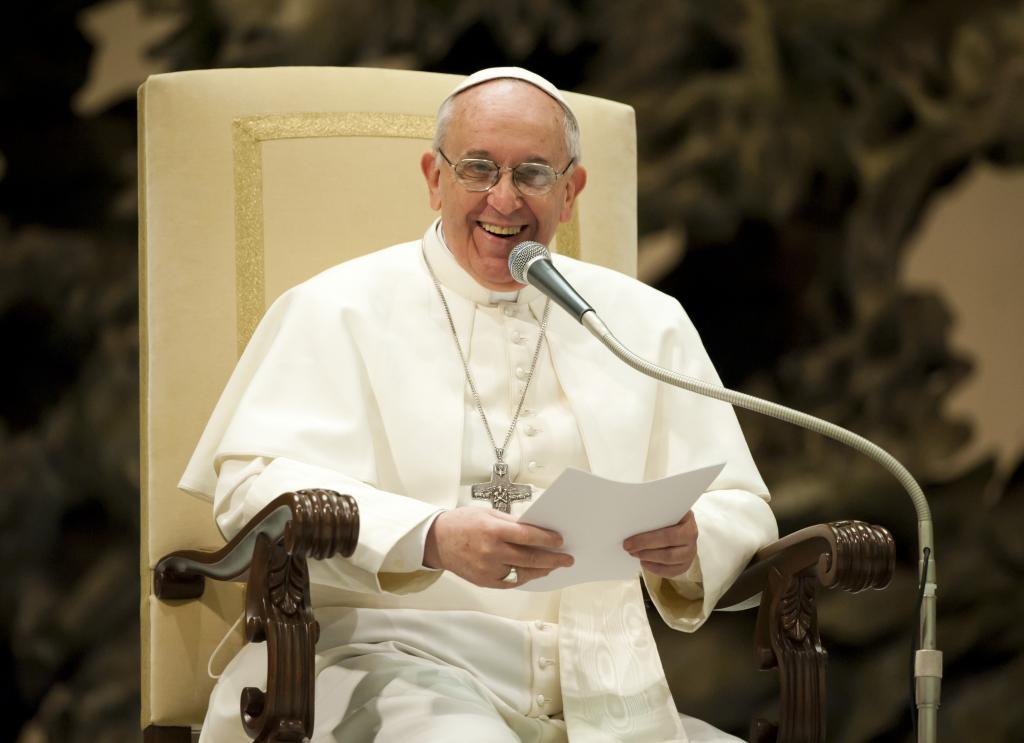
Matthias; Yes, he has this very positive approach to the world. Also he doesn’t seem to have any fear, which is remarkable I think. He seems to have left any anxieties behind – he is happy to be in dialogue with a whole variety of different people, he doesn’t feel the need for bullet-proof glass in the streets... He is also clearly very deeply rooted in prayer and, of course, he is very pastoral. He speaks out of a lived experience of prayer and of a real solidarity with people so what he says rings true as it feels very close to our everyday lives and experiences. So there is prayer, people are very close to his heart and there is a deep peace in him. And finally there is a real path of discernment in his ministry – he tries to balance an awareness of what the Church teaches and her tradition with an attitude of charity and hospitality to everyone out there. It’s also interesting that you can’t say he’s a liberal because he isn’t and he isn’t an ultra-Conservative as he is quite simply trying to discern, through different options, what leads more to Christ. He is influenced by the South American context, although he isn’t a liberation theologian. But his main attitude is one of discernment trying to know what God’s will is for the Church today.
Bala: Another thing which I admire in him is that he is clearly someone who knows that he is deeply loved by God. If I don’t have that self-awareness it is very difficult to give it back to the world. It looks very simple but it is not – to know that I am a child of God and that God is asking me to love others as he does, this is a challenge for all of us. Also I am struck by the internal freedom which he experiences, which helps to remove his inhibitions about “What will people think?”; “Will people understand me?” when every word he speaks can be instantly quoted and dissected in the media. He is internally free to believe that what the conscience and the heart speak, if rooted in God, cannot be a lie.
Absolutely, last question! Imagine a young person discerning their path in life in London today – if you were going to give them a top discernment tip, what would it be?
Bala: I would say, Sense your deepest desire, Spend time in prayer and Speak to someone. Also, I am in a Samuel Group and I really believe that such a group is a huge help, especially in asking the key question, “Do I have the desire to be closer to myself and to God?” If I have this basic desire, what concrete steps do I need to take? So don’t try to walk this walk alone – take the risk to join a discernment group, such as the Samuel groups.
Matthias: I know that when I was younger I was a bit in my head all the time, so I think it is really important to simply try things. If it is the priesthood, then go and talk to priests, get involved in the life of a parish so that you can see the reality of a priest’s life... The same would be true if I felt called to become a social worker – get some first-hand experience of this for a few months, and then reflect on the experience afterwards. This means that things don’t just go round and round in our heads but that we test them out in lived experience.
Thank you for all that you have shared and, of course, may God continue to bless you both for the journey ahead!
To find out more about the Jesuits see: www.jesuitvocations.org.uk
Also, for more information about the Spiritual Exercises and Retreats in the Jesuit tradition see: www.beunos.com
Cardinal Vincent Nichols ordained on Saturday 1 March nine Jesuits as deacons, in one of the first major ceremonies he has presided at since being created a Cardinal by Pope Francis.
For the past three years the new deacons have been studying at Heythrop College, which is celebrating the 400th anniversary of its foundation by the Jesuits in Louvain.
In his homily, he urged the deacons to 'know Christ Jesus' - quoting from St Paul's letter to the Philippians: 'All I want is to know Christ and the power of his resurrection'. He went on to compare St Paul running and aiming for perfection with the deacons' own journeys of faith.
Those ordained come from four continents and eight different Jesuit provinces. Two of them are from Sri Lanka and four come from India. At least two of them are hoping to return in the future to work in Guyana, a Region of the British Province. The remaining three deacons come from Brazil, Kenya and Germany.
